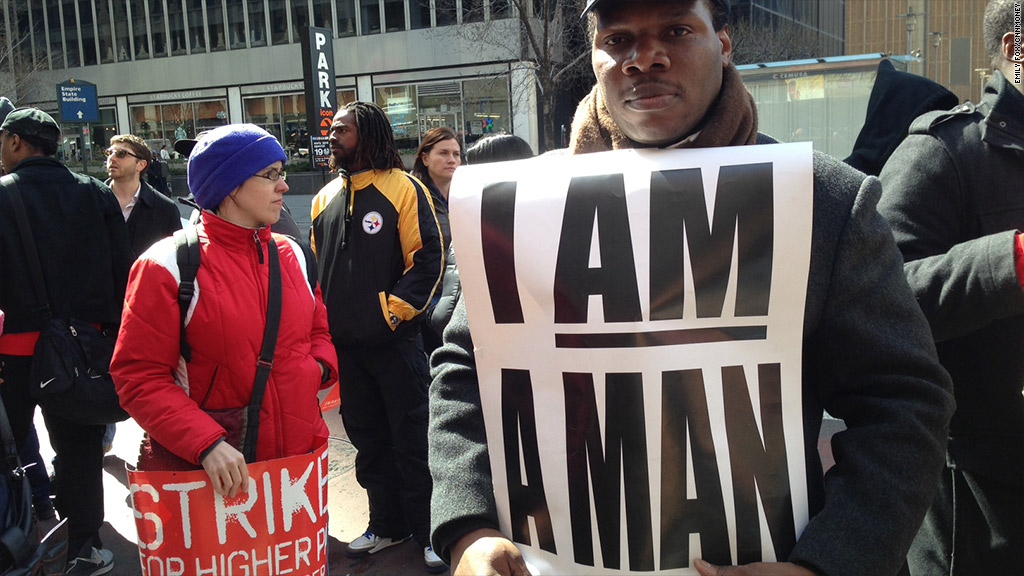
Noel Scott has been delivering Domino's Pizza in New York City for three years. He makes $5.45 an hour plus tips and has to work two other jobs to pay the bills.
Scott joined a protest Thursday outside of a Wendy's in midtown Manhattan, along with about 100 other fast food workers and activists. They were part of demonstrations held at 70 of New York City's McDonald's (MCD), Wendy's (WEN), Burger King (BKW) and Yum Brand (YUM)s-owned Pizza Hut and KFC locations. The protests were organized by a coalition of labor, community and clergy groups called Fast Food Forward.
The day started with dozens of workers walking off work at a McDonald's location near Times Square, according to Jonathan Westin, executive director of protest sponsor New York Communities for Change. He said that a Burger King on Flatbush Ave. in Brooklyn had trouble opening on time in the morning because so many of its workers had walked out.
A Burger King spokesman confirmed the restaurant opened 15 minutes late.
The group is asking employers to pay workers a minimum of $15 an hour, and for the right to organize without retaliation and intimidation. Currently, the median pay for the nearly 50,000 fast food workers in New York City is $9 an hour, or $18,500 a year, according to the New York Labor Department. That's about $4,500 lower than Census Bureau's poverty income threshold level of $23,000 for a family of four.
Related: Foreign worker hoopla forces McDonald's franchisee out
Scott said he delivers pizza about 25 hours a week. He also moonlights as a security guard and repairman in order to pay rent. In total, he works about 43 hours each week and gets no benefits.
While minimum wage in New York is $7.25 an hour, food service workers may earn $4.65 an hour because their total compensation includes expected tips.
"You don't have a life when you get paid this little. My body is breaking down," he said. "And with no benefits, we can't afford to get sick."
Domino's Pizza said that it's likely Scott works for an independent franchise. Tim McIntyre, a spokesman for the pizza chain, said its company-owned stores pay deliverymen minimum wage on top of tips. They also get reimbursed for using personal vehicles.
KFC, Burger King and McDonald's wouldn't comment specifically on the strikes, saying that the majority of their restaurants are owned by franchisees.
Some experts said that raising wages would be a burden for the franchisees, most of whom are small business owners.
"Any additional labor cost can negatively impact a restaurant's ability to hire or maintain jobs," said Scott DeFife, executive vice president of policy and government affairs at the National Restaurant Association.
Under the National Labor Relations Act, workers are protected from retaliation as long as they work in concert with at least one other employee to try to change their working conditions. However, they can be permanently replaced if they strike for purely economic reasons.

The protest organizer Westin said that more workers were participating Thursday, because the November protests raised awareness of their labor rights.
"The protestors in November showed that workers were able to look their managers in their faces and say they deserve better," he said. "Other workers were emboldened and the numbers are continuing to grow."
The walk outs were scheduled to coincide with the 45th anniversary of the assassination of Rev. Martin Luther King Jr., who was shot in Memphis on April 4, one day after he delivered his famous "I've been to the mountaintop" speech in support of striking sanitation workers.
"To think that in 2013 we're having the same discussion about gaining a respectable wage and the right to organize as we had in 1968 is ludicrous," said Minister Kirsten John Foy, a civil rights activist at the National Action Network in Brooklyn who is participating in the protests.
Labor experts say there have been scattered attempts to organize over the last several decades, but very little in the fast food industry has stuck. Many say that's because there is a high turnover rate of labor in the industry.





